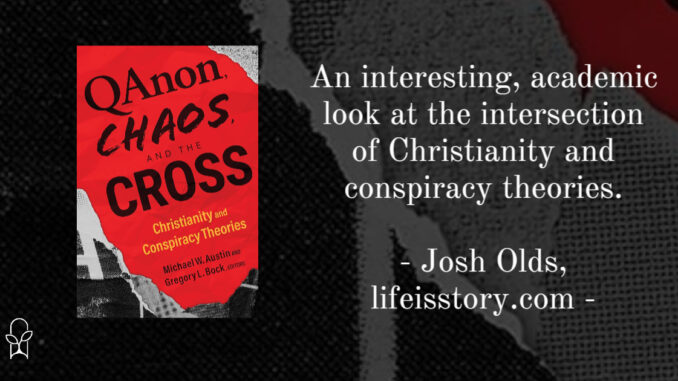
Also by this author: Humility: Rediscovering the Way of Love and Life in Christ
Published by Eerdmans on May 23, 2023
Genres: Academic, Non-Fiction
Buy on Amazon
Goodreads

Although Christians are followers of the Truth, many find themselves tempted by the alternate “truths” offered by conspiracy theories. Christianity and conspiracy theories have had a long, complicated relationship. But today conspiracy theories are bringing our already polarized society to the brink of chaos. QAnon, the Big Lie, and anti-vaccination theories thrive online, disrupting faith communities. This timely essay collection explores the allure of conspiracy theories and their consequences—and ultimately offers gospel-based paths forward.
Accessible to all concerned believers, QAnon, Chaos, and the Cross features scholars of religion, ethics, and public life on the following topics:
• evaluating evidence and forming beliefs
• the Satanic Panic of the 1960s–1990s
• understanding scientific methodology
• conspiracy theories’ appeal to those searching for meaning
• the consequences of social media and echo chambers
• productive dialog with people who hold different opinions
• intellectualism in the life of faith
• conspiracy theories in Scripture
• QAnon’s religious rhetoricComplete with a guide to reasoning, which outlines both logical fallacies and intellectual virtues, QAnon, Chaos, and the Cross is an indispensable resource for all Christians seeking the truth.
Why is it that Christians seem to be the most susceptible to conspiracy theories and wild beliefs? I mean, there is the whole thing where the central concept of our belief system is predicated on the resurrection from the dead—something that seems pretty darn conspiratorial. Remember that the official rebuttal to the resurrection was that there was a conspiracy to steal the body of Jesus. There’s also the idea of gnosis or secret knowledge that created trouble in the early church, the religious language and symbology that conspiracies often use, and a host of other things—like how QAnon adopts Christian rhetoric to further its objectives, using metaphors of “spiritual warfare” to depict its adherents as “soldiers in an ongoing war of cosmic significance” and employing Christian nationalist tropes. The list goes on.
QAnon, Chaos, and the Cross is an attempt by a range of Christian scholars to explore the intersection of Christianity and conspiracy theories, differentiate between the two, and explain the allure of QAnon to those within the Christian faith. This volume is edited by Michael Austin (a professor of philosophy at Eastern Kentucky) and Gregory Bock (assistant professor of philosophy and religion at University of Texas at Tyler). Austin and Bock have gathered over 25 professors, pastors, and public theologians to each write on some aspect of this intersections. These are all short essays, around ten pages each, making each chapter concise, succinct, and easily digestible.
Because there are so many authors, there is some amount of overlap in the content. QAnon, Chaos, and the Cross is not meant to be a comprehensive, singular observation but a series of interrelated observations. It’s asking all of the contributors the same question and seeing how their experience, expertise, and personalities flavor their answers. The result is a multi-faceted understanding of the intersection of QAnon and Christianity—from how it affects our faith, our politics, our parents, our philosophy, and more.
QAnon, Chaos, and the Cross addresses a range of topics including the evaluation of evidence and formation of beliefs, the Satanic Panic of the 1960s-1990s, understanding scientific methodology, and the appeal of conspiracy theories to those searching for meaning. It makes clear that the acceptance of conspiracy theory is not something new to this generation of Christianity but has always played a feature in religious thinking. The contributors also discuss the impact of social media and echo chambers, the role of intellectualism in faith, conspiracy theories in Scripture, and QAnon’s use of religious rhetoric. While some entries are noted to be stronger than others, each one is said to provoke thought and discussion.
Chase Andre’s chapter on “The Religious Rhetoric of QAnon” was particularly helpful for me as a pastor to understand how the language of conspiracy theories are purposefully built to mirror the types of rhetoric Christians have already come to accept. Although not the chapter’s purpose or explicitly stated, it made me reflect on my own use of rhetoric: Am I treated Christianity like a conspiracy theory? Garrett DeWeese’s chapter on “Can We Trust Science?”, which specifically relates to the aversion some Christians have had to the COVID-19 vaccine is also helpful. Christians have a long history of warring against science, be it heliocentrism, evolution, or climate change. Rather than give a pat answer, DeWeese briefly outlines how Christians should test science by doing scientific inquiry.
Altogether, QAnon, Chaos, and the Cross is an interesting look at the intersection of Christianity and contemporary conspiracy theories. Its multidisciplinary approach and accessible writing make it a valuable resource for those grappling with the challenges posed by these theories within faith communities. It’s probably not going to convince anyone deep into conspiracy to get out, but it will give tools to their families and friends to begin to do the work of reflecting the truth.
